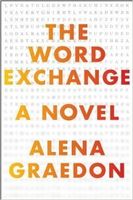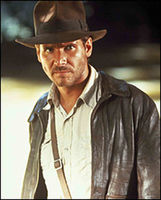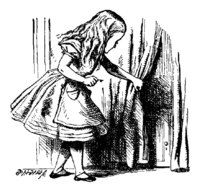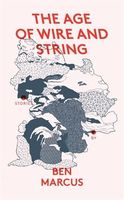Words & Curds: Alena Graedon, Author of the Word Exchange
By Evan Munday
On April 23, I met with debut American author Alena Gradeon, who just released her first novel, a language-based dystopian thriller called The Word Exchange, published by Random House Canada. Graedon, originally from Durham, North Carolina, currently lives in Brooklyn and was in Toronto to read at the IFOA Weekly Series at Harbourfront Centre. We visited Smoke's Poutinerie, where Graedon ordered the 'Veggie Deluxe' (topped with mushrooms, sautéed onions and peas) and I ordered the 'Butter Chicken' (kind of self-explanatory). We talked about Hegel, the rock stars of the dictionary, and empanadas. Usual stuff.
About The Word Exchange: (adapted from the Random House Canada site) In the not so distant future, the forecasted 'death of print' has become a reality. Bookstores, libraries, newspapers, and magazines are a thing of the past, as people spend their time glued to handheld devices called Memes that have become so intuitive as to hail cabs before people leave their offices, order take-out at the first growl of a hungry stomach, and even create and sell language itself in a marketplace called The Word Exchange. Anana Johnson works with her father Doug at the North American Dictionary of the English Language, where Doug is hard at work on the final edition that will ever be printed. When Doug disappears from the NADEL offices, Anana uncovers the clues he's left behind and begins a journey down the proverbial rabbit hole in search of something called 'The Diachronic Society.' But before long, Anana's problems compound when a vicious word flu strikes the populace, causing speakers to rapidly lose language.
EVAN: The book is set in a future where books have become everything short of obsolete … well, not so much obsolete as non-existent.
ALENA: In other words, it's set in reality.
EVAN: (Laughs) Yeah, well, that's what I was going to ask. People are reliant on these 'memes' and … how do you feel about the fact I read this book as an ebook?
ALENA: (Laughs.) I feel fine about it. How do you feel about it?
EVAN: I felt fine about it, too, but I was kind of weirded out, reading it. I was, like, Oh … this is …
ALENA: I've heard that from a few people. I think one of the things about reading it on a Kindle, for example, is that it makes it easier to look up the words that people don't know. And I think that that's sort of … was both really convenient for people and creeped them out a bit.
EVAN: Because they're like, 'I'm in the Word Exchange right now.'
ALENA: But also, there are some footnotes and I think that those are maybe easier to read on a printed page. Or maybe on an iPad or something that shows the whole page of the book. But I think in some ways, certainly, we are starting to approach the reality that's depicted in the book. We hear all the time about libraries that are being threatened. The New York Public Library in New York – there's a very public campaign to keep it open and keep it from changing in dramatic ways. And bookstores are shutting all the time. There was some Pew Study recently that said people are reading much, much less than they used to. Well, reading books. Because, of course, we're all reading …
Your CanLit News
Subscribe to Open Book’s newsletter to get local book events, literary content, writing tips, and more in your inbox
EVAN: Online, reading Twitter feeds and –
ALENA: Yep. And so, in those ways, yes. We're sort of approaching the reality that I described. And also, of course, our devices are notably with us. I am as dependent on my iPhone as anyone. I'm totally addicted to Words with Friends. (Laughs.) It was a little bit of inspiration for the book.
EVAN: It's research!
ALENA: Yeah, exactly. But, at the same time, I don't think that it's a foregone conclusion at all. I think that people will always read books, will probably always read print books, even. I also don't think that necessarily the ways in which the characters have started to become totally dependent on their devices, I don't think that that's an inevitable outcome either.
EVAN: It's sort of one possible …
ALENA: Yeah, I set it in the near future because I thought that it would help shine a light on the present a little more. Sort of show us what a possible outcome might be if something were to go wrong. And, obviously, my main intent was just to write a story that people would hopefully get engaged with and be entertained by … but also maybe open up this ongoing conversation that we've been having as a culture about the ways in which technology entwines with our lives and the ways in which we've become more and more fused with our devices, and just to think about how we want that process to unfold. Because it's going to keep happening. There's nothing inherently wrong with that. But it's worth being active participants in that process and not just, sort of, getting pulled along.
EVAN: Yeah, being more conscious about that rather than just letting it happen … without thinking that much about it. That's funny. When I first started reading the book, I think I thought of it as an alternate present … though later it became clear that it was set slightly in the future …but I thought it was an alternate present, where we call these things 'memes' instead of 'iPhones' or whatever. Just some slight change in the present day. The other thing I thought was interesting was that it explores themes of language, meaning, semiotics, technology – I think in the acknowledgements, you mention that Nicholas Carr's The Shallows was something that was an influence – and it talks about all these big ideas about language and meaning and technology, but it does so in the form of, basically, a thriller – a techno-thriller or cloak-and-dagger pandemic story. What made you choose to explore those ideas in such a form?
ALENA: Like you said, language really is at the centre of the book. And I think that it's just an amazing communal resource that only works because we all share in learning it and maybe teaching it, and it has a capacity to bring people together – across generations, across time … it's amazing when I read passages from Old English and I can sort of fumble my way through an understanding of what it is. Or to read things in translation from other parts of the world. But at the same time, I wanted to look at what if something were to happen to language? And what it might mean if it were to get corrupted and how that might pull people apart. In some ways, it's a metaphor. A lot of philosophers and thinkers think about language as one of the most innately human traits.
EVAN: It separates us from the animals. [Not sure why I felt the need to say that.]
ALENA: And we're in this interesting transitional moment where we're becoming more and more hybridized with these machines that are augmenting our thinking and our bodies. And so, I wanted to explore what it means – I mean, not to be too grandiose about it – what it means to be human now. And I thought that focusing on language was one lens to look at the ways in which we're changing in broader directions. But I also am just interested in language – in what it does and represents. I was interested, too, in imagining how instead of bringing people together, it turns on its head what language is supposed to do. Instead of transmitting information, it transmits confusion. Instead of bringing people together, it separates them and isolates them. Both because they can't be understood, but also because they're afraid of catching … of infection …
EVAN: Yeah, we'll they're just afraid of talking with anyone. Actually, I was going to arrive with a little cloth with the 'O' with the slash through it. Just so you knew I was safe.
ALENA: Well, thank you.
EVAN: I can see things like Fahrenheit 451 and The Book Thief in this book, and even non-book-related things. I'm thinking of TV shows like The Prisoner, things like that. Were any books or films influences, not so much on the theme but on the world that you tried to create?
ALENA: I didn't think of it in such explicit terms. I definitely read Fahrenheit 451 in middle school along with a lot of other people. And I revisited recently and was excited and struck by what a weird and interesting world it is. But also how unusual and striking the language is that Bradbury uses. But I didn't – I sort of intentionally set out to try not to have models for the world.
EVAN: Well, I think part of the reason it works is that it's so not alien. You can see all this stuff happening tomorrow.
ALENA: Right, exactly. It is very familiar in a certain way. And, in fact, it was in later stages of the book when I'd hear about things like Pontypool [We'd talked about Tony Burgess's Pontypool before recording.] – well, I didn't hear about that until super-late in the stage – but other things that had similar themes, and I intentionally waited to read these things until after I was done. I didn't want to be too influenced. I read a lot of things, as far as research goes. I did a few different kinds of research. I did some interviews with people, I did some site visits, and I read as much as I could. I was super-lucky to meet with the then-chief editor of the Oxford English Dictionary in Oxford, which was amazing. We took a whole day and he took me all around and showed me the front- and the back-end of their digital corpus. And he introduced me to an editor-at-large in New York for the OED, who ended up helping with some of the sections in the book later on. It was awesome. Because there's only so much you can learn about lexicography by reading. There's a lot that you can only see when you visit the offices. In terms of the fiction research I did, I was reading books to see how people dealt with multiple narrators. Books that had two or three points of view. But I wasn't really reading things that would inspire the world so much.
EVAN: Want me to give you more time to eat some of that?
ALENA: Okay, great. It's really tasty.
EVAN: Yeah, but it's better when it's warm.
ALENA: Want some? [Alena offers poutine to publicist Evan Klein, who politely declines.]
EVAN: Did you want to try any of this? [Evan offers the butter chicken poutine, also refused.]
ALENA: It's really good. I'm so psyched. It's really delicious.
EVAN: There's a great line in the letter from Douglas to Anana (or Alice), where he says, 'Maybe it was naive, but I believed the lexicographic life would be relatively calm.' I hope you don't take this in any way as offence, but one of the great things about the book is it kind of does for lexicographers what Indiana Jones did for archaeologists.
ALENA: Oh, I am thrilled to hear that.
EVAN: Working with words and definitions became this amazing serial adventure.
ALENA: Well, thanks. That's great to hear. I remember after my launch in New York, the guy who I was just referring to, Jesse Sheidlower, at the time was an OED editor-at-large in New York. He came up to me at the event and was like, 'This is one of the few adventure stories that involves dictionary editors. I'm so excited.'
EVAN: Do you feel like people who do lexicography – are they, in some small way, heroic?
ALENA: Absolutely. I think so. For one thing, I think the things they're doing behind closed doors – they really do labour in obscurity – and the potential for it to be tedious is great. But then the results are so magnificent, so interesting. I mean, once a thing makes its way into the OED, it's there for all time. So, they have to use so much discernment and they have to have so much stamina … and I think that sometimes, those quiet moments of heroism don't get heralded. They're sort of my rock stars and I was really excited to meet these guys in person.
EVAN: That's awesome. One thing about the book is that your protagonist, Anana, is, at least at the start of the book, a non-believer. She enjoys her job at the Dictionary, but she got it through family connections. She herself is more interested in visual art and images and she's also highly dependent on her meme and the Word Exchange. Is there a reason you made your protagonist someone who is not necessarily part of the Diachronic Society? Someone who is not already a convert?
ALENA: I think partly because she's a little bit of a proxy for me. She's sort of a stand-in. I think that I, too, find myself enamoured of both worlds. I wouldn't say that I am strictly Diachronic Society or someone who would be an adherent of the Synchronic team, y'know. I'm not so similar to Anana in that many ways, but just in this sense of ambivalence at which world I belong to and how I'm, sort of, affiliated.
And I think in some ways she also mirrors Alice (in Wonderland). There are definitely some affinities between their characters. Partly because of Anana's dependence on her devices, she – at the beginning of the book, especially – doesn't have a super-strong sense of self. She's a little bit tossed in the winds and she finds herself in this crazy world where less and less makes sense – literally. Words and language start losing meaning. I mean, sometimes, I think of Alice as kind of a passive character. Sort of a victim of these very bizarre circumstances. But she's not at all. She has to constantly learn the rules of this world she's been thrown into and that's the way she advances and makes her way through this topsy-turvy world. And Anana kind of has to do the same thing. She's using her own inner resources to figure out the rules of this world and make her way through it.
EVAN: My other question is – in some levels, the book is similar to, like I said, a potboiler thriller. But then, you're name-dropping Hegel and de Saussure. Were you ever worried about combining this fairly high-level language theory with people in black chasing each other down alleyways?
ALENA: Yeah. I did have some concerns about that and especially that people wouldn't quite know what to make of it. Which genre it fell under. As with so many writers, I was trying to write a book that I would want to read. Or that my friends were going to read, or my brother would want to read. I get engaged by entertaining stories. But at the same time, the reading experience is even more gratifying if it asks something of me. Sort of makes me think something and not just have something done to me. If it's sort of a dialectical experience in that way. There are ruminations on philosophy and language, but not, I hope, at the expense of the story. Because I'm always drawn to stories that have ideas behind the actions. But that also include action. (Laughs.)
EVAN: (Laughs.) So it's not just the ideas … percolating. Can you tell me a little bit about writing the word flu? The virus expresses itself in aphasia. One of the things I noticed when reading it, or, at least, I felt like it – were you hoping to recreate the experience of the people –
ALENA: Yes!
EVAN: – in that reading it, you have the same thoughts as the characters: there are these sort of nonsensical words that interject into people's speech and letters …
ALENA: I was, absolutely. I was really trying to use language as a tool for demonstrating what the loss of its meaning would feel like. And – exactly – to replicate how the characters might feel alienated or estranged if they didn't have words anymore and didn't know the meanings behind the words. My goal was to offer a suggestion of that alienation … but only a suggestion. Without taking the reader out of the story. It just seemed like it would be impossible to recreate this world without also demonstrating what it feels like …
EVAN: – what it felt like to someone who is slowly –
ALENA: … to honour the word flu.
EVAN: I feel like if I were slightly more obsessive-compulsive, I would have gone through and tried to figure out if there was a connection …was there a glossary,? Or were they more randomly …
ALENA: I did initially have a glossary, but there are actually two word flus in the book.
EVAN: Yeah, because there's the one that's –
ALENA: – just a misfiring of the device –
EVAN: – and there's the more terminal version where you could possibly die.
ALENA: Exactly. The true word flu that spreads through a virus. Because there were two different viruses and because they actually changed over the course of the revisions, that glossary became sort of obsolete. Initially, the first word flu – a lot of those words are manufactured words. Some of those are put together by sweatshop workers.
EVAN: Yeah, and you see there's a lot of cyrillic in some of them …
ALENA: Yep.
EVAN: … because the workers were Eastern European.
ALENA: Exactly. And some of them were Chinese, and I actually studied Mandarin for years, so those words kind of bubbled up in my brain. But also, it was very fitting with the circumstances of the workers who were manufacturing those fake terms. But then, for the other aphasia, it is actually slightly different, especially in the very final stages. I tried to make it simulate, in some ways, what someone that has a neurodegenerative illness – like, say, encephalitis – might actually manifest in terms of aphasia. So, in that case, those types of aphasic word are more like slips, truly … like words that are out of context, or words where one letter is wrong. Those sections were the hardest to write, and for some readers, they're also the hardest to read. (Laughs.) But I did really try to tweak it so that those sections are still intelligible.
EVAN: No, I think it works … There are all those internet things that get passed around where it's impossible to see the error, or you can read a whole sentence even though every other word has been messed up.
ALENA: Totally.
EVAN: I have a food question. Prior to today – or before this interview was set up – would you have had to look up 'poutine' in The Word Exchange?
ALENA: Yeah. I mean, I've heard it referred to before so many times. Especially by my Canadian friends. But also, it's starting to be popular in the States, as well.
EVAN: And even here, I would say, less than ten years ago, it was only a thing in Quebec. And since then, it's really started to …
ALENA: Oh, really? Well, it's delicious, so it's not surprising. I think I knew that it was this 'prevent-a-hangover' type food. I thought that it involved fries, but I wasn't sure what was involved more than that. So this is amazing. I'm completely psyched.
EVAN: Also, along the lines of food inquiry, the food most featured in the book is empanadas.
ALENA: Yes.This is not so different from that in a certain way.
EVAN: I was going to say, why empanadas? Why is everyone always ordering empanadas?
ALENA: Well, I think that it's kind of a perfect food, actually. Certainly, almost every man I've ever known, starting with my older brother, is a big fan of the empanada. And I thought that it would be something that the character Bart would also really enjoy. It's also pretty common in the neighbourhood where he lives, Washington Heights. There are a lot of food carts that have them. They're just this super-quick, little portable pouch of starch (laughs) … with deliciousness inside. This is a little less portable and a bit messier, but … it's the same basic idea.
EVAN: I imagine this is sort of a close equivalent in your neighbourhood.
ALENA: Yeah, sort of. I was thinking about the empanadas, and it does say something about Bart that they kind of make him sick – that food – and he knows it. He has sort of a secret hedonist streak, even though he seems like somebody so nerdily cerebral. In his head, and sort of disconnected from the pleasures of the body. But he does like eat them. He likes the same instant gratification that the guys he hangs out with are into.
EVAN: It's almost like his association with those friends has heightened his – like, he's not necessarily that bookish, nerdy type, but just being around them magnifies it. One of my favourite scenes is when he orders the empanadas and he runs into Max, and he's like, 'You don't even like empanadas.' And Bart goes, 'Oh yeah, I don't …' And then Max eats them. But he does!
ALENA: I think you're right. I think that's so true in my own life, too. That our personalities wind up being sort of polarized or heightened by the people they're bounced off.
EVAN: Yeah. One of the great things about the book, I thought, were – the chapters go from A to Z (or A to Zed) with chapter titles and definitions.
ALENA: (Laughs.)
EVAN: But the definitions are not, obviously, taken out of the Oxford or Webster. How did you decide on those definitions?
ALENA: I actually started with the definitions. The definitions were the seeds for the whole book. I think that writing a novel is a really daunting prospect. Maybe especially a first novel, but I don't know. I've only done the one. And the idea of sitting down to a totally blank document really intimidated me. But I knew that I wanted to have some sort of framing structure. And that I wanted it to be in twenty-six chapters, if that could end up working out. And I thought that it would be a nice anchor point, both for me and for the readers. To have a little definition – fictional definition to start every chapter – and so, I wrote those before I wrote any of the chapters. Some of them changed, of course, because the story sort of changed and evolved. But it definitely kept me reined while when I was writing. Those were some of my favourite things to write in the book. Those fake definitions.
EVAN: Yeah, it's sort of like The Devil's Dictionary by Ambrose Bierce … a dictionary but it's sort of his … own dark take on that word and its definition.
ALENA: I was sort of inspired by a book of stories that I read early in college by Ben Marcus, who later became a professor of mine when I was in grad school. But he wrote this great, really weird book of stories called The Age of Wire and String and it also has some fake definitions. And I think reading those, they just always stuck with me. When I had the idea for this book, it seemed like a very natural next step. To write these fake definitions.
EVAN: The book has – correct me if I'm wrong – has been translated into, I think, eight languages …
ALENA: It's being translated.
EVAN: Oh, it's being translated currently? Because I was going to ask –
ALENA: – I feel so bad for my translators!
EVAN: – I was going to say, how difficult will that be? Especially given, not only the word flu, but also those chapter definitions?
ALENA: I know. It's going to be really interesting to see. And already, there have been some interesting things that have happened during the translation. In Denmark, I think, they've changed the title because they thought that The Word Exchange wouldn't have any meaning there. So they changed it to The Last Word, which I also really like. I'm going to be really fascinated to talk to some of the translators.
EVAN: Do you speak any of the languages it's being translated into?
ALENA: Well … actually, Chinese, I guess. I studied Chinese for four years. And it's being translated into Mandarin and being published in Taiwan. Not in Mainland China. (Laughs.)
EVAN: The book is pretty sympathetic to Taiwan.
ALENA: Actually, I was just telling Evan [Klein] that I've been studying a lot of languages. Not even connecting to the book, but I've been trying to just bone up on some Romance languages. But I speak French … a little …
EVAN: Oh, one other small thing: when the pandemic breaks, the big day was December 7. Was that a conscious choice? December 7 is, in my mind, Pearl Harbour. 'A day which will live in infamy.'
ALENA: Oh, of course! It wasn't. I used a calendar for a year in the future, which I won't name to maintain the screen, but I really need to keep track – because there was so much happening, so many different points of view, and the timeline was kind of intricate, I needed it to be anchored to an actual calendar. So I knew what was happening when. And that just happened to be the date in which it needed to fall. This is the first time Pearl Harbour was brought to my attention. It didn't really occur to me.
EVAN: One last thing I wanted to ask. After I finished your book, I read some of the reviews and some of the interviews you've done, and one thing that people seem to shy away from is love.
ALENA: Yeah, you're right!
EVAN: This book is super-full of love, right? And as much as it talks about technology and language and how those are changing and how they affect each other, it also talks a lot about how language affects love, or the notion of love, or how you perceive another person while in love. Am I right? Is this book almost as much an investigation of that?
ALENA: For sure. Yes. I really – even though it includes these ruminations on language and philosophy, and it's a bit of a mystery and a bit of a thriller – it is this story about our most abiding relationships. Between parents and kids and people who are falling in love with each other and even between different versions of ourselves. So, absolutely. I think that language is this amazing frame for sharing our subjective experience. The way people sort of try to approximate some true notion of the way the person sees the world. And that will necessarily affect our relationships.
EVAN: In the book, memes are not available in the U.K. or Canada.
ALENA: Yeah, not in Canada.
EVAN: So, thank you for sparing us for the most part.
ALENA: Well – you guys sometimes have a little more common sense about waiting to see what the crazy effects of something will be before you just take it on.
EVAN: Do you regret sparing us, now that you've tried our secret weapon, poutine?
ALENA: No. I'm convinced even more now that it was a good choice.
Poutine Count:
Evan: 3
Authors: 0
The views expressed in the Writer-in-Residence blogs are those held by the authors and do not necessarily reflect the views of Open Book: Toronto.
The views expressed in the Writer-in-Residence blogs are those held by the authors and do not necessarily reflect the views of Open Book.
Evan Munday is the author and illustrator of the acclaimed book series for young readers, The Dead Kid Detective Agency. Both The Dead Kid Detective Agencyand its sequel, Dial M for Morna, were nominated for the Silver Birch Fiction Award.
Evan has worked in book marketing and publicity for ten years, eight of which were as publicist at Coach House Books, and he has since worked as a freelance illustrator and ebook designer.
Find out more about Evan on his website, idontlikemundays.com or follow him on Twitter at @idontlikemunday.








